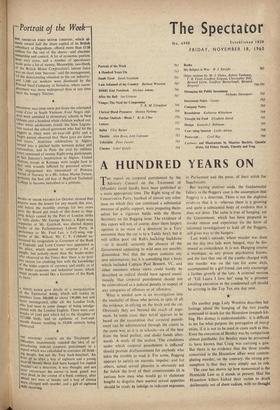A HUNDRED YEARS ON
TEM report on corporal punishment by the Advisory Council on the Treatment of Offendeis could hardly have been published at a more appropriate time. The Right wing of the Conservative Party, baulked of almost any other issue on which they can command a substantial measure of public support, were preparing them- selves, for a vigorous battle with the Home Secretary on the flogging issue. The existence of this report will not, of course, deter them (expert opinion is no more of a deterrent to a Tory extremist than the cat is to a Teddy boy); but it will stiffen poor old Rab's buCkling backbone —or it should; certainly the chances of the Government appeasing its wild men are sensibly diminished. Not that the report contains any new information; but it is something that a body which included Captain Paul Bennett, VC, and Other members whose views could hardly be described as radical should have agreed unani- mously 'that corporal punishment should not be reintroduced as a judicial penalty in respect of any categories of offences or of offenders.'
What is needed now is an investigation into the mentality of those who persist, in spite of all the evidence, in relying on the birch and the cat. Obviously they are beyond the reach of argu- ment. In some cases their belief appears to be based on the assumption that corporal punish- ment can be administered through the courts in the same way as it is in schools—six of the best from the head prefect, and shake hands after- wards. A study of the section 'The conditions under which corporal punishment is inflicted' should provide disillusionment for anybody who takes the trouble to read it. For some, flogging appears to satisfy an atavistic impulse; and for others, actual sexual pleasure is obviously not far below the level of their consciousness (it is curious how men who would go to elaborate lengths to disguise their normal sexual appetites should be ready to indulge in indecent exposure, in Parliament and the press, of their relish for flagellation).
But leaving motives aside, the fundamental fallacy in the floggers' case is the assumption that flogging is a deterrent. There is not the slightest evidence that it is—whereas there is a growing' and quite a• substantial body of evidence that it does not deter. The same is true of hanging; yet the Government, which has been prepared to invoke reason and experience (in the form of informed investigation) to hold off the floggers,' still gives way to the hangers.
Last week's episode, where murder was done on the day two lads were hanged, may be dis- missed as coincidence. It is not. Hanging creates a mystique, as any prison psychiatrist knows. and the fact that one of the youths charged with this murder was on the run for some days, accompanied by a girl friend, can only encourage a further growth of the lore. A criminal version of .`Tell Laura I love 'her' sung by a prisoner awaiting execution in the condemned cell should be arriving in the Top Ten any day now.
On another page Lady Wootton describes her feelings about the hanging of the two youths sentenced to death for the Hounslow towpath kil- ling. Her dismay is understandable: it is difficult to see for what purpose the prerogative of mercy exists, if it is not to be used in cases such as this. Even the execution of Bentley was by comparison almost justifiable; for Bentley must be presumed to have known that Craig was carrying a gun. But there is no evidence that the three youths concerned in the Hounslow affair were contem- plating murder; on the contrary, the strong pre- sumption is that they were simply out to rob.
The case has shown up how nonsensical is the Homicide Law as it stands at present. Had the Hounslow killers kicked their victim to death deliberately out of sheer sadism, with no thought of theft, they would have been alive today; but because he was killed by accident in the course of a robbery with violence, they were hanged. This, surely, is exactly the kind of case where the prerogative of mercy should be used. But the prerogative is, in effect, in the hands of the Home Secretary; and it is becoming increasingly appar- ent that Mr. Butler, for all his humanitarian repu- tation, appears reluctant to exercise it. Where a murder receives as much publicity as the Houns- low case did, it creates an ugly reaction on the Right; if things go on as they are it will be easier to get a reprieve for a murder committed in the North of England, where there is less publicity, at least in the national press; a Home Counties killer has much less chance, unless he commits murders so vile that he can get off on the score of insanity.
A constantly reiterated argument is that aboli- tionists have sympathy only for the criminal, not for the victim. But nothing more can be done for the victim: he is dead. Something can be done, or could be if the Home Secretary had the guts to do it, to save future victims, by examining condemned murderers—including those youths who are not murderers at all in the ordinary sense of the term, but who are responsible for such repulsive crimes as the Hounslow case—to find out why they are criminals. What arc the defects,*moral and social, which have made them turn to 'crime? For if we fail to find out these things, we are in fact in effect condemning men and women to death by violence, who need not die.








 Previous page
Previous page